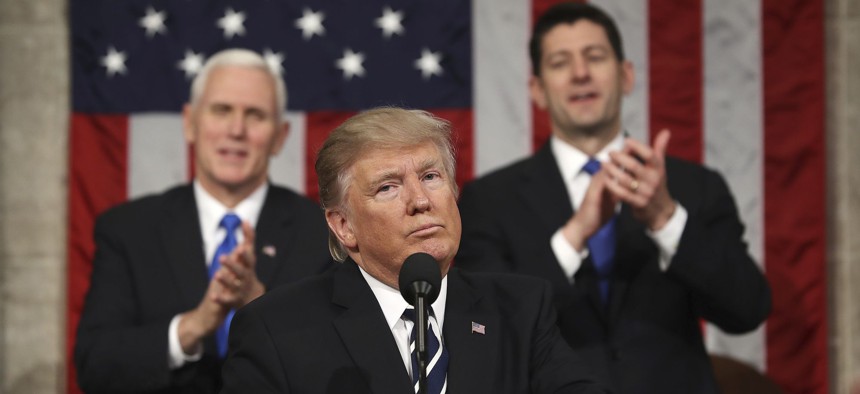Here’s What Trump Said About Infrastructure and Medicaid in His Address to Congress

President Donald Trump reacts after addressing a joint session of Congress on Capitol Hill in Washington, Tuesday, Feb. 28, 2017. Jim Lo Scalzo / Pool Image via AP
The president’s speech included few new specifics about proposals that could affect state and local governments.
President Trump said during an address to a joint session of Congress on Tuesday night he would ask federal lawmakers to approve a $1 trillion infrastructure package that includes public financing and that states should have greater flexibility with Medicaid.
What form the president’s infrastructure proposals take and what happens going forward with Medicaid are two issues with major implications for state and local governments. Trump’s speech touched on a wide range of other topics, such as military spending and immigration.
There has been speculation about how much the president’s infrastructure plan will rely on private financing versus federal money.
With Medicaid, there has been disagreement among governors about possible changes to the funding structure for the program, which provides low income Americans access to health care.
In his speech, Trump promised “crumbling” infrastructure would be replaced with “gleaming” new roads, bridges, tunnels, airports and railways.
“The time has come for a new program of national rebuilding,” the president said. “I will be asking Congress to approve legislation that produces a $1 trillion investment in infrastructure of the United States—financed through both public and private capital,” he added.
The president did not indicate what share of the $1 trillion his administration will push to make available through federal funding or loan programs, or how much it will seek to generate through private investment by using incentives such as tax credits.
“While I am encouraged by the president's plans to invest in infrastructure, we need additional details,” Pennsylvania Gov. Tom Wolf, a Democrat, said in a statement after Trump’s speech.
Republican congressional leaders have exhibited little eagerness for vast new federal infrastructure spending. Senate Democrats in January unveiled their own $1 trillion infrastructure proposal. But there are major questions about how that plan could be paid for.
Turning to Medicaid, Trump voiced his support for “flexibility,” a term typically synonymous these days with GOP proposals to shift the federal funding that goes to states for the program to a model that involves either spending limits per enrollee or fixed block grants.
Federal spending on the Medicaid program is currently open-ended, as opposed to capped, and varies based on factors like the number of enrollees and costs for care.
States spent a combined sum of about $197 billion on Medicaid during the 2015 fiscal year, according to figures compiled by The Henry J. Kaiser Family Foundation. The federal government spent about $334 billion, or around 62 percent of the program’s total costs.
Discussions about Medicaid are taking place as the Trump administration and Republicans in Congress push to repeal the Affordable Care Act, the 2010 health care law also known as Obamacare, which Trump characterized on Tuesday night as “collapsing.”
Former Kentucky Gov. Steve Beshear discussed the Affordable Care Act as he delivered the Democratic response following Trump’s speech. “You and your Republican allies in Congress seem determined to rip affordable health insurance away from millions of Americans,” he said.
“Does the Affordable Care Act need some repairs?” Beshear questioned. “Sure it does.”
“But so far,” he said, “every Republican idea to replace the Affordable Care Act would reduce the number of Americans covered.”
Trump also said he would call on lawmakers to pass an education bill that “funds school choice for disadvantaged youth.”
“These families should be free to choose the public, private, charter, magnet, religious or home school that is right for them,” the president said.
He went on to highlight the violent crime that has plagued parts of Chicago, noting the city had over 4,000 shootings in 2016. The exact figure was around 4,300.
Chicago Mayor Rahm Emanuel, a Democrat, issued a statement after Trump’s speech.
“We have repeatedly made specific requests of the administration for greater law enforcement integration and resources,” he said. Making federal gun prosecutions a higher priority and restoring funds for mentoring, after-school and summer jobs programs were examples he cited.
“I’ll always be ready with this list whenever the President asks,” Emanuel said. “The better question, I’d suggest, is whether the President cares enough about violence in our city to do more than talk or tweet about it.”
Bill Lucia is a Senior Reporter for Government Executive’s Route Fifty and is based in Washington, D.C.
NEXT STORY: The Trillion Dollar Question Hanging Over Public-Private Partnerships






